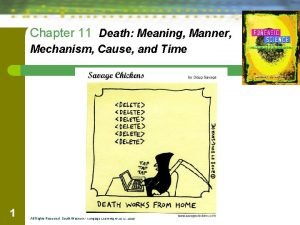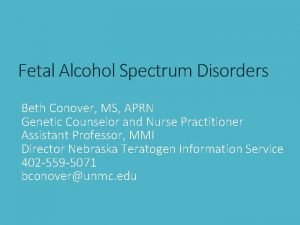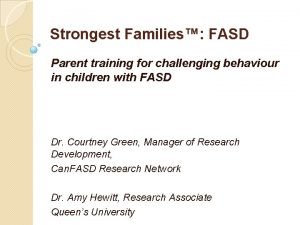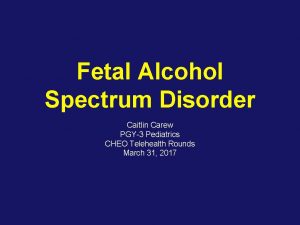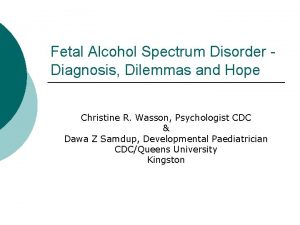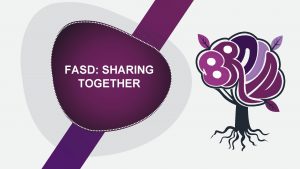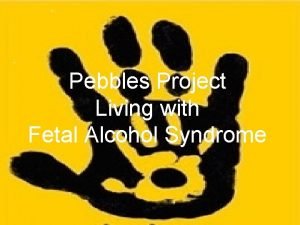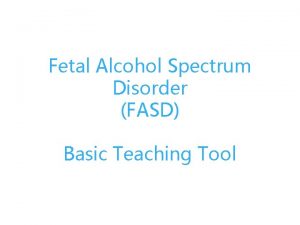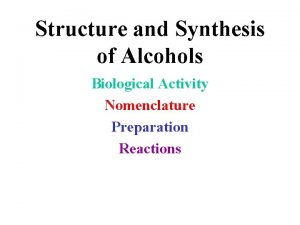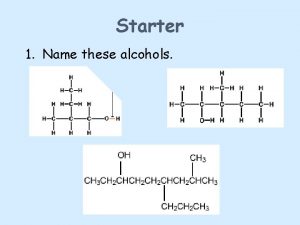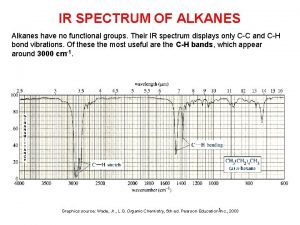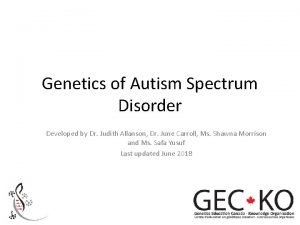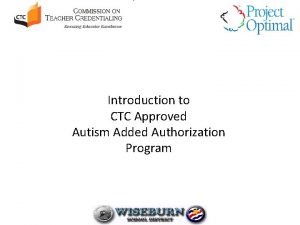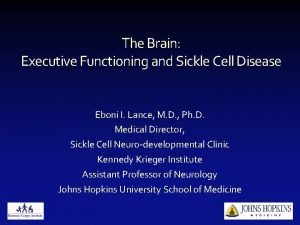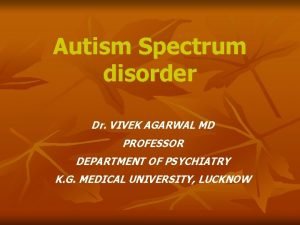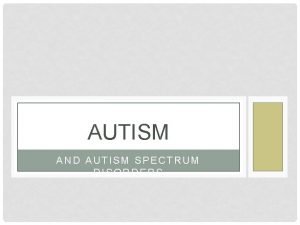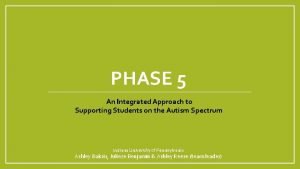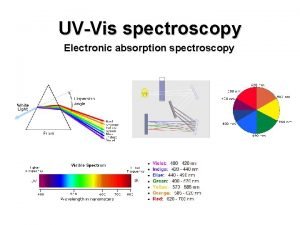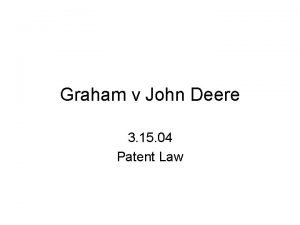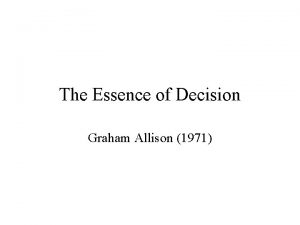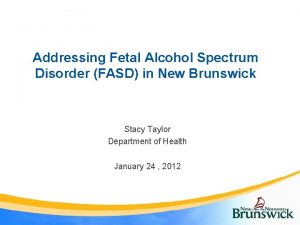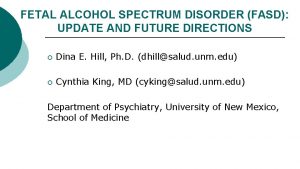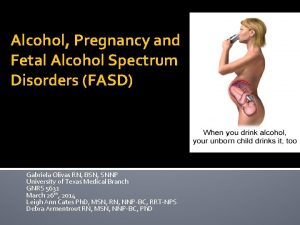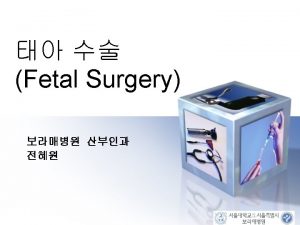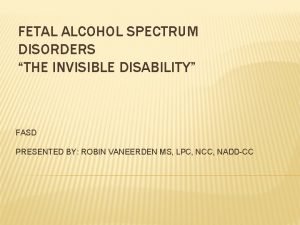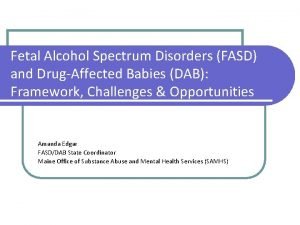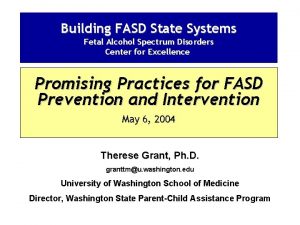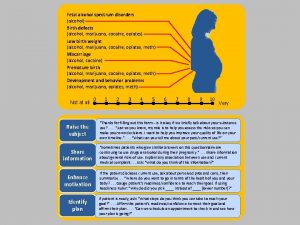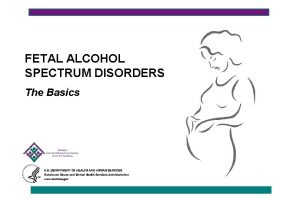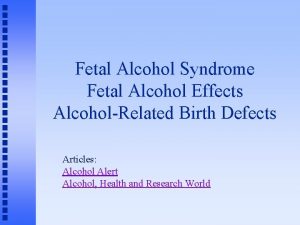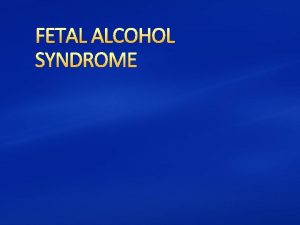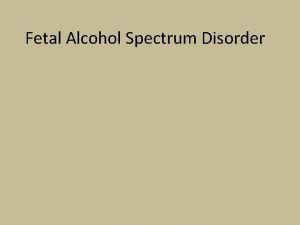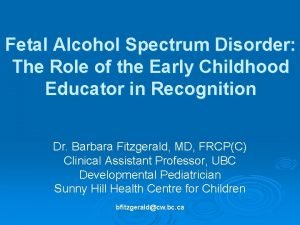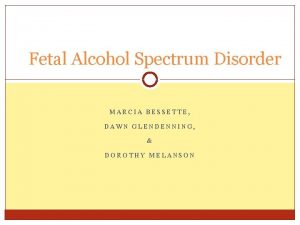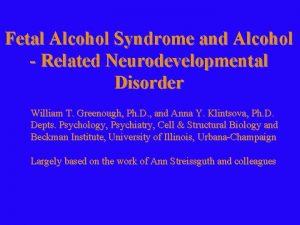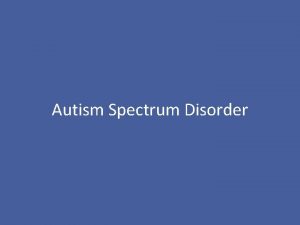FASD Fetal Alcohol Spectrum Disorder Jennifer Graham Jessica





























- Slides: 29

FASD Fetal Alcohol Spectrum Disorder Jennifer Graham, Jessica Mercier-Mac. Donald & Lisa Wells

What is FASD ■ Fetal Alcohol Spectrum Disorder is a term that describes a wide range of effects that can occur in an individual who was exposed to alcohol during pregnancy. ■ FASD itself is not a diagnostic term, it encapsulates 4 specific medical diagnoses. – Fetal Alcohol Syndrome (FAS) – Partial Fetal Alcohol Syndrome (p. FAS) – Alcohol Related Neurodevelopmental Disorder (ARND) – Alcohol Related Birth Defects (ARBD)

Prevalence & Diagnosis ■ Prevalence has remained consistent from 2006 to present as found through multiple provincial and national studies – Approximately 1 % of the population OR 9. 1 / 1000 individuals ■ Multidisciplinary assessment ■ Early diagnosis is essential ■ FASD Center of Excellence – Maria. desroches@vitalitie. nb. ca – (506) 869 - 3572

Diagnostic Criteria Fetal Alcohol Spectrum Disorder Partial Fetal Alcohol Syndrome (p. FAS) Alcohol Related Neurodevelopmental Disorder (ARND) Physical indicators small for age distinctive facial appearance: - small eyes - smooth philtrum (area between the nose and upper lip) - thin upper lip abnormal brain function Physical indicators some, but not all, of the physical signs of FAS abnormal brain function Physical indicators there are no identifiable physical features specific to ARND abnormal brain function Abnormal brain function, evident throughout the spectrum, includes impairment in at least three of the following brain domains: • hard and soft neurological signs (including sensory-motor) • brain structure (head circumference or size, magnetic resonance imaging) • cognition (IQ) • communication (both receptive and expressive) • academic achievement • memory • executive functioning (common sense) and abstract reasoning • attention deficit/ hyperactivity • adaptive behaviour, social skills, social communication

Possible Problem Areas ■ Physical Motor Skills ■ Sensory Processing ■ Communication Skills ■ Memory Skills ■ Executive Functioning and Abstract Reasoning ■ ADHD ■ Adaptive Skills

Physical Motor Skills Gross Motor Skills Strategies ■ Poor co-ordination ■ Stable seating, chair with arms. ■ Abnormal muscle tone ■ Variety of positions to do work ■ Poor body awareness ■ Gross motor activities BEFORE fine motor ■ Balance and coordination activities ■ Upper body exercises

Physical Motor Skills Fine Motor Skills Strategies ■ immature grasp and manipulation patterns ■ Supportive seating ■ Extra time for writing with breaks ■ decreased hand strength, low muscle tone, causing students to tire faster fine motor tremor ■ Reduce the amount of copying required ■ Keyboarding ■ Extra practice in printing (Multi-sensory approach for printing, ) ■ Soft slide on pencil grippers/ weighted pencil for fine motor tremor ■ Gross motor activities BEFORE fine motor ■ Hand strengthening activities ■ poor bilateral hand use ■ no established hand dominance

Sensory Processing Skills Due to the complex brain function od students with FASD these students misinterpret sensory information. ■ Some are bombarded by sensory information ■ Some seek out sensory stimulation When setting up classroom: ■ Structure and routine are of the utmost importance ■ Less is best

Sensory Processing Skills Visual Strategies Auditory Strategies Tactile Strategies • Reduce the amount of information on the walls (removable sheet) • Smaller attainable visual steps (diagram) • Visual schedule and timers • Colour code • Picture symbols to songs and classroom routine • Visual boundaries • FM systems • Prepare students for fire drills and announcements • Sound cancelling headphones • Noise reducing materials throughout physical environment • Stress balls • Fidget toys • Listening helpers for the mouth (gum, sucking on candy or straw) • Deep pressure touch • Air filled chair cushion

Communication Skills Expressive Language Receptive Language Dev. ■ Sound Development (phonics) ■ As a result of difficulty processing information there is generally listening problems – Comprehension (add numbers vs. find the sum? ) – Discrimination (same vs. different) – Association and generalization – Sequencing (plot) – Selective attention (skimming/ scanning) – Memory ■ Vocabulary (semantics) or grammar (syntax) not at age level ■ Cannot retrieve words from memory – Toast = warm bread – Sheep = goat (same category)

Communication Skills Strategies ■ Simple materials with illustrations ■ Ask child to show what is needed instead of asking to repeat verbal instructions ■ Picture dictionary ■ Verbal cues (songs/chants) ■ Post information that student need to remember (procedures/ key words ■ Social stories ■ Speak face – to – face (use students name) ■ Line markers when reading ■ Audio books ■ Avoid figures of speech & sarcasm ■ Limit the number of questions or tasks (one step at a time) ■ Teach in the environment that the skills are expected to be performed

Memory Skills Encoding / Storage / Retrieval ■ May no be able to respond to questions. ■ Forget how to do tasks. Strategies ■ TEACH sequencing, categorizing and organizing ■ Gets in trouble because rules not followed. ■ Routine, structure, repetition. ■ Remember better if they use their senses. ■ Pre-teach ■ Hands on activities ■ Post-teach ■ Have students learn HOW to locate what they need rather than memorize.

Executive Functioning and Abstract Reasoning Higher-order cognitive processes including: ■ Inhibition Behaviours ■ Stealing, lying, defiance ■ Flexibility of thinking ■ Not able to predict the consequences of behaviour ■ Working memory ■ Easily manipulated by others ■ Planning and predicting ■ Difficulty making and keeping friends ■ Cause and effect ■ Judgment ■ Organization ■ Overly friendly and affectionate ■ Disorganized

Executive Functioning and Abstract Reasoning: Strategies ■ Take time to get to know student and understand how they think ■ Decide what is most important, and ignore the rest ■ Be as consistent as possible ■ Help students problem solve ■ Help students take another person’s point of view ■ Allow cooling down time ■ Anticipate and prevent problems

ADHD: Strategies ■ Teach self-talk to keep students focussed ■ Concrete reinforcements and reminders ■ Consequences for inappropriate behaviour need to be immediate ■ Reading is a rocking chair ■ Quiet background music/ teaching through music ■ Arrange a quiet area to used when distractions are to great ■ Establish a signal to indicate frustration ■ Make each activity brief

Adaptive Skills ■ Eating ■ Table manners ■ Basic hygiene ■ Clothing and dressing appropriately ■ Sense of direction ■ Knowing home address ■ Money management ■ Time The process of teaching adaptive skills ■ Modeling, role play ■ Guided practice ■ Use of consistent language (home and school) ■ Re-teach ■ Immediate feedback ■ Praise all successes

Activity/Discussion ■ Each group will be given 5 minutes to strategies would benefit a student with FASD in a given subject area. ■ Remember to evaluate how each learning skill may affect a student with FASD and how you will address this challenge within your classroom. • • Physical Motor Skills Sensory Processing Communication Skills Memory Skills • Executive Functioning and Abstract Reasoning • ADHD • Adaptive Skills Group 1 Reading & Writing Group 2 Mathematics Group 3 Science Group 4 Fine Arts

Reading and Writing Strategies ■ Graphic organizers ■ Stop at key points to check for understanding (comprehension) ■ Verbal and visual instructions ■ Checklists ■ Slow the tempo (increase your wait time) ■ Recognize that students may not understand complex language ■ Enlarge font and white space ■ Repetitive teaching

Mathematic Strategies ■ Continuous use of the number line ■ Daily math fact practice ■ Timed tests may not work for the student ■ Group like problems together and gradually add different types of problems ■ Graph paper ■ Calculator ■ Focus on practical, functional math ■ Songs and poems (repetition)

Science Strategies ■ Exemplify scientific ideas through the use of concrete materials (models) ■ Study science that is directly affecting the students (nutrition, body functions, cooking) ■ Adaptive lab equipment ■ Teach vocabulary and use alternative text at the students level (activity oriented materials) ■ Clearly label all materials ■ Be alert to the possibility of the student freezing under time restraints

Fine Arts Strategies ■ Co-operative and group learning, foster student involvement ■ Connect to real world ■ Multi-sensory experiences ■ Direct teaching of social skills ■ Graphic organizer of key concepts ■ Use art to label and teach language of the tasks and the emotional context of the situation

Comorbidity ■ Mental Health – isolation – anxiety – self worth ■ Social problems – law – substance abuse – Homelessness ■ Behaviour disorders – aggression – risk taking

What students want teacher to know! Joe’s Ideas for school ■ ■ Let me use the computer unless I want to write Me talking and someone else writing works! Talk less and show me more Give me things to look at when you are teaching to help me remember ■ Make sure I am tuned in !!

www. youtube. com/watch? v=_Pe 1 acd 0 CHI Tania Peterman on living with FADS

What parents want teachers to know! ■ TEAM approach works best. ■ Plan for success! ■ Open communication (my child may not remember). ■ Acknowledge struggles. ■ Tell me of the success of the day, no matter how small. ■ Share resources. ■ Include my child in trips and extracurricular activities. ■ Teach other students tolerance. ■ I am doing the best I can.

https: //www. youtube. com/watch? v=m 7 zf. JCW 9 Yco Kathy’s story: Mother of FASD

What teachers need to know!! 1. Collect information. 1. History. 2. Involve parents. 3. Ask questions. 2. Make a plan. 3. Evaluate the plan. 4. Make referrals. 5. Develop an individual education plan.

Students Like Me

References Texts Videos ■ ■ “Students like Me” Episodes 1 – Childbirth Media Centre ■ “Nicholas” / “Tania” / “Alcohol & Adoption” – Alcohol Free Pregnancy ■ “Kathy’s story” (a mother of FASD) – SAMHSA ■ Inclusion of Exceptional Learners in Canadian Schools By: Nancy Hutchinson – Chapter 5 (Pages 151 to 153) What Educators Need to Know about Fetal Alcohol Spectrum Disorder – Healthy Child Manitoba (2009) ■ Tips for talking with Parents (Center for Disease Control, www, cdcgov/actearly) ■ Well Beings: A Guide to Health in Child Care By: Canadian Paediatric Society ■ Child and Adolescent Development: A Chronological Approach Bukatko
 Fetal alcohol spectrum disorder
Fetal alcohol spectrum disorder Adult fetal alcohol syndrome
Adult fetal alcohol syndrome Fasd behavior checklist
Fasd behavior checklist Fasd
Fasd Fas
Fas Fetal alcohol syndrome face
Fetal alcohol syndrome face Alcohol
Alcohol Teetotal celebrities
Teetotal celebrities Fetal alcohol syndrome life expectancy
Fetal alcohol syndrome life expectancy Life expectancy fetal alcohol syndrome
Life expectancy fetal alcohol syndrome Fetal alcohol syndrome
Fetal alcohol syndrome High boiling point alcohols
High boiling point alcohols Oxidation primary alcohol
Oxidation primary alcohol Factitious disorder
Factitious disorder Alkanes ir spectrum
Alkanes ir spectrum Spectrum disorder
Spectrum disorder Ctc added authorization
Ctc added authorization Autism spectrum disorder adhd
Autism spectrum disorder adhd Sensory processing disorder dsm
Sensory processing disorder dsm Spectrum disorder
Spectrum disorder How to describe autism
How to describe autism Spectrum disorder
Spectrum disorder Orbital description
Orbital description Absorption spectrum vs emission spectrum
Absorption spectrum vs emission spectrum Billy nnn bibl
Billy nnn bibl Graham v john deere
Graham v john deere Hip-ennial
Hip-ennial Graham vs connor
Graham vs connor Graham jenkinson
Graham jenkinson Allison 1971
Allison 1971
